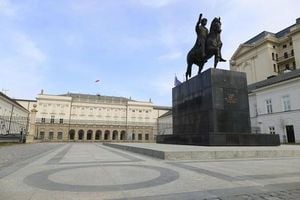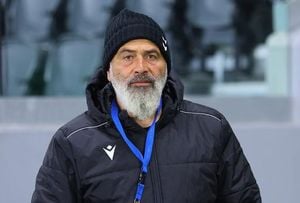The political atmosphere in North Macedonia has recently been charged with discussions concerning national identity, particularly focusing on the national anthem and coat of arms. Zekirija Ibiri, the leader of the Alternative party, has proposed significant changes to the national anthem, aiming to represent all ethnic communities within the nation adequately.
During his appearance on the popular show 'Dialogue on Lime,' Ibiri emphasized the need for the anthem to reflect the diverse makeup of North Macedonia. "One of the ways is to have an anthem without lyrics or to create another text without ethnic identity or one where all other ethnic groups will be included and can sing it in any language from any ethnicity. Macedonians, Albanians, Turks and others can sing it in their language," he stated. This progressive approach aims not only to honor the country's multicultural fabric but also to promote internal cohesion among its citizens.
Ibiri's proposal suggests several possible routes for the national anthem's adaptation. One option discusses creating two texts within the anthem, one for Albanians and the other for Macedonians. Alternatively, he considers crafting one unified text embracing all communities or even rendering the anthem wordless to accommodate various cultural expressions. Such discussions could fundamentally reshape how the anthem is perceived and experienced by the diverse populace of North Macedonia.
These proposals arose during broader discussions related to the potential alteration of the national coat of arms as well. The governing coalition, particularly the VMRP-DPMNE, has encountered pushback against these suggestions. The party's spokesperson has categorically denied any discussions surrounding the anthem, stating, "The citizens can be at ease. The DUI's matrix of ethnicizing all important issues must stop... Neither has there ever been any discussion about changing the anthem nor will there be any discussion about it in the future." This firm rejection exemplifies the tensions surrounding ethnic issues and representation within political discourse.
Such debates about national symbols are not new to North Macedonia; they often garner significant public interest and have historical roots tied to the nation's quest for unity and identity post-independence. The national anthem has long been considered not just a patriotic symbol but also one of national pride and collective memory. Any proposed changes evoke strong feelings among various factions within society, illustrating the sensitive nature of embodying diverse identities within national narratives.
Public reactions to Ibiri's proposals have varied, with some citizens expressing support for inclusivity and representation across different ethnic communities, and others cautioning against complicity with what they view as divisive rhetoric. Numerous discussions have circulated on social media platforms, where the merit of revising the anthem is hotly debated among North Macedonians.
Leaders from different political parties have begun to emerge with diverse statements reflecting their respective ideologies and visions for the future. No matter the outcome, the conversations surrounding the anthem and coat of arms will bring to light important questions about the essence of national identity and what it means to unite under one symbolic representation.
North Macedonia stands at a crossroads—balancing tradition with the pressing need for inclusive representation. With multiple ethnic groups comprising its population, the nation grapples with how to embrace diversity within its core values. The potential groundwork laid by discussions on the anthem could set precedent for future legislative changes, affecting how citizens view their representation and inter-ethnic relations.
This topic will remain central to North Macedonia's political narrative, requiring nuanced dialogue as it navigates the delicate balance of maintaining historical symbols and fostering unity among its diverse communities. The integrity of national symbols will inevitably shape the societal framework as leaders continue to address the needs and rights of all citizens, steering the country toward harmonious coexistence.



